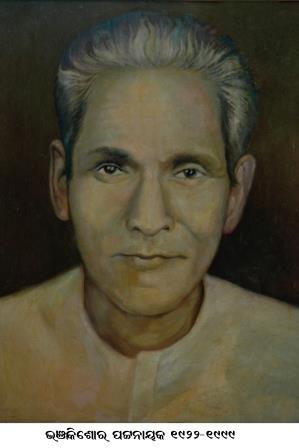Shree Bhanjakishore Pattanaik
Died :- 27-Nov-1999
Place of Birth :- Chhanipur, Cuttack

Renowned literary figure Shri Bhanjkishore Pattnayak was born in the village of Chhanipur in the undivided Cuttack district. Sadhucharan Pattnayak was his father and and his mother’s name was Satyabhama Devi. Shri Pattnayak was an actor, poet, novelist and a playwright at the same time, which is a testimonial to his versatility. It is believed that he authored more than thirty successful and popular plays. He was very popular in the golden age of commercial theatre.
Being a man of progressive thought Pattanayak was associated with Nabakrishna Chowdhury's Communist Workers' Union in 1932, the publication of the journal ‘Sarathi’ in 1936, the founding of the Nabayuga Sahitya Samsad in 1935, the publication of the ‘Adhunik’ in 1936, and Socialist Party’s organ ‘Farmer’ in 1937. On the eve of World War II, Pattnayak wrote his first play, ‘Jhada Rati’ (The Stormy Night – unpublished) which is based on the full potential of social commitment. However, his first script for Annapurna Theatre was ‘Devi’ in 1945. This one established him as a dramatist. Its commercial success encouraged him to write plays like ‘Jahar’ in 1946, ‘Benami’ (Anonymous) in 1946, and ‘Tofan’ (Typhoon) in 1949.
‘Manik Jodi’ in 1951 brought him fame as a mature author for artistically portraying the conflict between two feudal families over a piece of land. It was made into a popular film. Again, in ‘Jaya Malya’ (Victory Garland) in 1952, Pattnayak examined a new field competently. This was with the difficulties of a creative writer. In ‘Agni-pariksha’ ('Fiery Test) in 1956, his message was that some scientific inventions meant for human welfare could cause further hazards. Both ‘Devi’ and and ‘Garib’ (Poor) made perfect portrayal of how capitalist exploitation and economic inequality has devastated families. Financial crisis in rural life has been beautifully portrayed by him. The emergence of new exploitative villains is portrayed in plays like ‘Pahili Raja’, ‘Saanta Ghara’ and ‘Manika Jodi’.
In ‘Akash Jeunthi Matiku Chhuen’ (Where Sky Touches the Earth) Bhanjkishor not only described social problems, but also prescribed the course of social reform. Western education is based on the primitive seeds of polygamy. He pointed its consequences to the public in Odisha. The female protagonists of the play — Subhashi of the play ‘Kula Bohu’, Devi of the play ‘Devi’ and Anupama of ‘E Jugara Jhia’ (Today’s Girl) have come out with flying colours in their struggle in the prevailing social spectrum. Anupama opposed the demand of dowry and came back from her father-in-law’s house. She decided to remain in her village and improve the lot of the people. Similarly ‘Savitri’ in the play ‘Tofan’ has become vengeful against the male in the society.
In general, the literary climate in Odisha was dominated by the Bhanjkishore’s plays that had a large number of idealistic characters. Through the characters – Jahar in the play ‘Jahar’, Sitanatha of ‘Benami’, Chudamani of ‘Tofan’, Braja of ‘Jayamalya’ and Sagar of ‘Agnipariksha’, Bhanjakishore suggested that many personal and social problems can be solved by some sacrifice and adjustment.
However, Bhanjkishore's plays depict many of the social problems that took place in Odisha following World War II. Portrayal of fraudulent transactions of counterfeit notes in ‘Shikari’ (Hunter) and lust for money in ‘Sadhavi’ (Woman Hermit) is made while depicting its attendant consequences. Similarly, the picture of growth in criminal tendency along with the growth of unemployment in the then prevailing conditions has been vividly illustrated in ‘Digdarshana’.
A strong belief in ancient heritage influenced his philosophy of life as well. So he suitably and vividly inserted three aspects of Indian tradition, i.e.- truth, non-violence, renunciation etc. in nearly all his plays. Like his contemporaries, he followed the principles of stagecraft established by Kali Charan Patnaik. Bhanjakishore Pattnayak's analysis of human relations and behaviour appears realistic. In conceiving a well-knit plot, contemporary characters, and simple, straightforward dialogue he was no less than his peers.
Bhanjakishore Pattnayak’s noted play ‘Manik Jodi’ was made into a film in 1963. He also wrote dialogue for ‘Jeevan sathi’ (1963) and ‘Raja Harischandra’ (1984).
He was honoured with the Odisha Sahitya Akademi Award and the Odisha Sangeet natak Academi Award for his immense contribution to Odia dramma. He died in 1999.
Books
Plays
Copyright © 2024 Odia Virtual Academy. All rights reserved Total Visitors- 1
Powered by: Odia Virtual Academy

